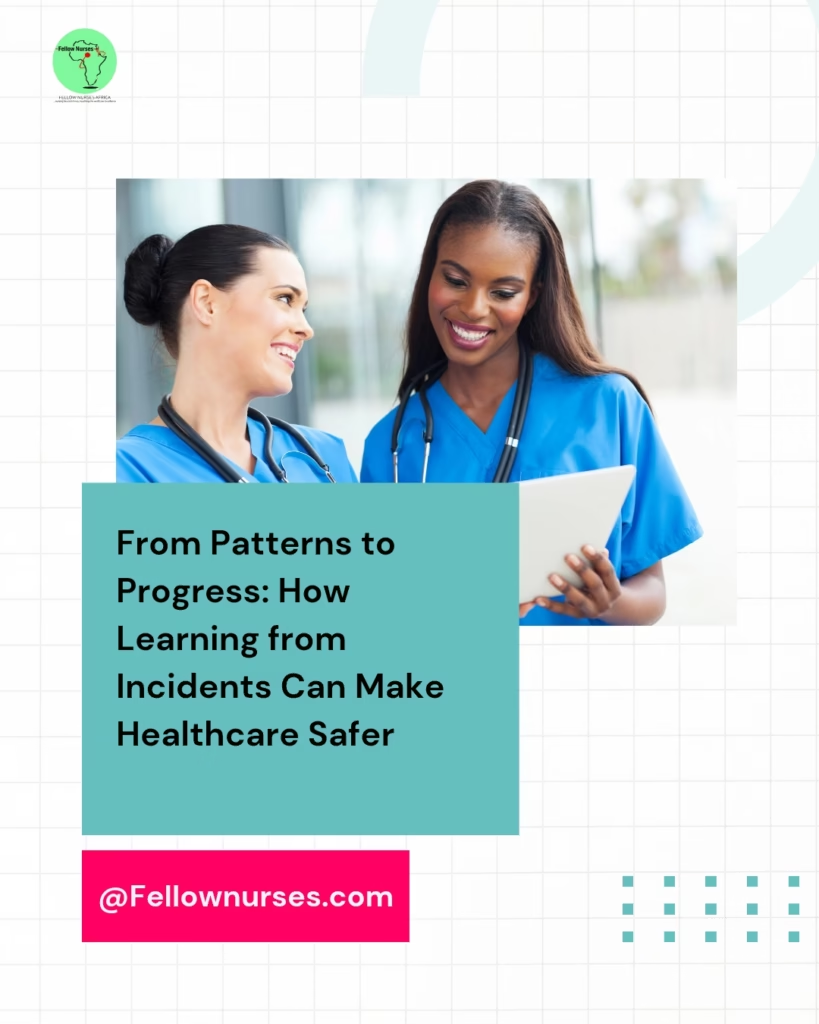Every Healthcare Worker Has a Defining Moment
By Aderonke Opawande
Every nurse or healthcare worker has that one moment that sticks with them. A patient who deteriorated too fast. A crucial detail missed during a handover. A situation where you knew something had been overlooked. These moments can make us feel powerless—but the truth is, we’re not, as long as we learn from them.

Having worked in healthcare systems across Nigeria and the UK—including care homes, hospitals, public health, and mental health services—I’ve realized that every incident tells a story. Not just about what went wrong, but about what we can improve.
What Is Thematic Analysis, and Why Does It Matter?
Thematic analysis helps us identify patterns in safety incidents. Instead of treating each case as a separate issue, we step back, connect the dots, and look for trends.
For example, when I reviewed absconding incidents in mental health units—where patients left care without permission—some common themes emerged:
- Inconsistent personalized care plans
- Environmental risks
- Gaps in staff handover and engagement
- Other patient-related factors
These weren’t just individual mistakes—they were system-wide issues. By improving handovers, increasing engagement, and creating safer environments, we reduced the risk. The system adapted, and patient safety improved.
You Don’t Need Expensive Tools to Start Learning
Whether you work in a well-funded NHS Trust or a small private hospital in Nigeria, you can begin analyzing incidents with three simple questions:
- What keeps going wrong?
- What patterns show up across different cases?
- What can we change to improve safety?
You don’t need advanced software or a big budget. A simple monthly review of recurring incidents, team discussions about safety trends, or a whiteboard tracking common risks can make a big difference. The key is fostering a culture of learning and open communication.
Why This Matters for Nurses in Africa
Healthcare workers in Africa provide outstanding care despite limited resources. However, preventable safety issues like delays, misdiagnoses, unsafe discharges, and communication failures still occur.
Thematic analysis shifts the focus from blame to solutions and empowers nurses to:
- Recognize and report recurring safety issues
- Advocate for system-wide improvements
- Use data and real-life experiences to push for safer practices
By tracking common risks and working together, we can prevent repeated mistakes and create safer healthcare environments.
Turning Incidents into Opportunities for Progress
Mistakes will happen, but repeated harm doesn’t have to. Whether you’re a frontline nurse or a healthcare leader, you can help improve patient safety one pattern at a time.
Let’s stop asking “Who got it wrong?” and start asking “What can we learn?” Real change happens when we stop treating incidents as isolated events and start seeing them as opportunities for progress.
Have You Noticed a Pattern in Your Workplace?
What recurring issues have you seen in your healthcare setting? What small changes have improved patient safety? Share your experience in the comments or reach out—your insights could help others improve their practice.
About the Author

Aderonke Opawande is a UK-based registered nurse, healthcare analyst, and patient safety advocate with extensive experience in Nigeria and the UK. She holds a master’s degree in healthcare management and multiple certifications in digital health, project management, and quality improvement. Passionate about strengthening health systems and empowering nurses, Aderonke writes to help healthcare professionals turn daily challenges into system-wide solutions.











